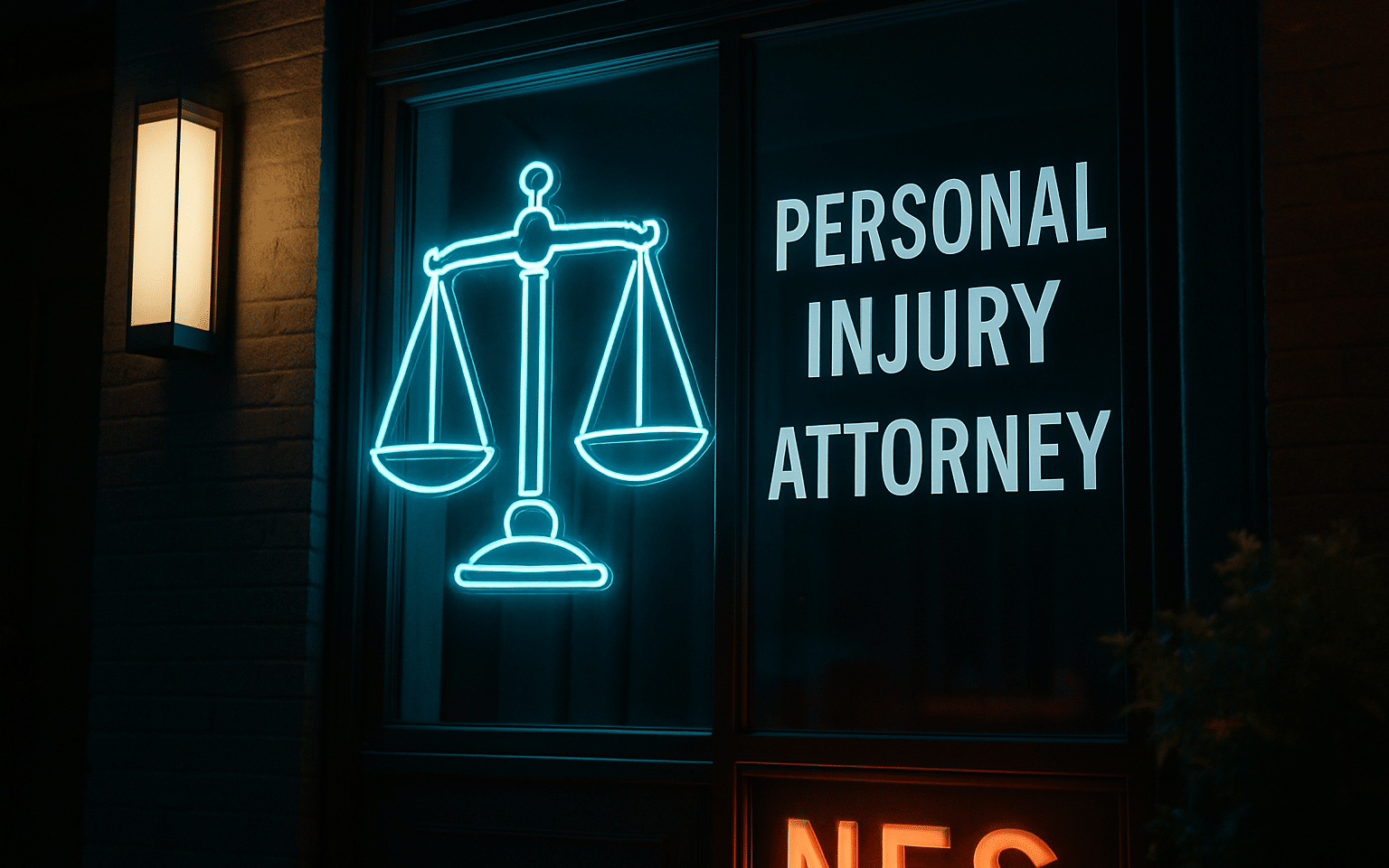
Jump to a section:
Personal injury law is intensely competitive and one of the most contested practice areas in terms of advertising and marketing. Therefore, your local SEO strategy should help you stand out in the saturated market and appeal to potential clients whether they’re dealing with a slip-and-fall injury, a car accident, or medical malpractice issues, for example. If your firm appears at the top of local (Google) search results, there is an enormous opportunity for your firm to outshine competitors and connect with accident victims or injured individuals who need an advocate quickly.
Challenges Personal Injury Law Firms Face in Local SEO
Saturated, Highly Competitive Market
Since personal injury law is fiercly competitive, potential clients can often find dozens or even hundreds of attorneys who specialize in car accidents, slips, product liability, etc. A targeted local SEO strategy empowers smaller or mid-sized firms to effectively compete with larger firms who may have substantial marketing budgets.
Varied Case Types and High-Value Leads
Personal injury law encompasses numerous case types, including motor vehicle accidents, medical malpractice, worker’s compensation, dog bites, nursing home abuse, etc. and often involves high stakes for both the clients who may be severely injured and for the attorneys who invest time, resources, and energy into contingent-fee cases. Your online content and SEO strategy should reflect the variety of your work with dedicated pages and resources that demonstrate expertise in each of your areas of expertise.
Strict Advertising and Ethical Constraints
Legal advertising is subject to ethical rules set by local bar associations and personal injury marketing is often cited for overly aggressive tactics. Therefore, you must balance an assertive online presence with an adherence to these local bar association rules and guidelines. Your local SEO strategy should, then, focus on value and trust-building rather than sensational advertising, especially as it can resonate with clients and help you avoid ethical pitfalls.
Highly Emotional Client Experiences
Clients looking for personal injury attorneys are often in pain or distress as they face overwhelming medical bills or life-altering injuries. This emotionality means that they look for attorneys who appear to be compassionate, credible, and easy to contact. Your local SEO strategy and online presence, therefore, should emphasize your empathy and trustworthiness.
Laying the Foundation for Local SEO
Before you employ any new marketing campaigns, you’ll need to build a strong foundation for your local SEO efforts.
- Conduct a Local SEO Audit: Evaluate where you currently stand with tools like Google Search Console, Google Analytics, Screaming Frog, and Ahrefs to identify any site issues and gaps in your local presence. Be sure to also check your website’s technical health like broken links, security, slow page speeds, and mobile responsiveness, existing local citations, your Google Business Profile (GBP), and which local keywords you’re currently ranking for (car accident lawyer, worker’s comp lawyer, etc.).
- Define Your Target Audience: Be very specific and clear about who your audience is, who you serve, and your specializations. For example, do you focus on motor vehicle accidents including trucks, medical malpractice, or workplace injuries? Each has its own unique concerns and searches differently.
- Understand Local Search Intent: When you understand why someone searches for specific services in a specific location and the nuances of their searches, you can ensure your content addresses the exact questions and pain points that corporate clients have when searching.
Optimizing Your Website for Local Searches
Your website is the digital face of your firm. Therefore, your website should instantly let prospective clients know that they’ve come to the right place for personal injury law queries and should communicate to Google that your website is relevant for local searches.
On-Page SEO Essentials
- Title Tags and Meta Descriptions: These should be concise (about 60 characters and 150 characters respectively) and include local keywords like “San Diego Car Accident Attorney”.
- Header Tags (H1, H2, H3): That incorporate relevant keywords.
- Keyword Placement: Integrate local keywords naturally within your content while avoiding stuffing, or overusing them, which can harm your ranking and readability.
- Mobile-Friendly Design: A little more than 63% of web traffic comes from mobile devices, with local searches particularly common on smartphones, so it’s critical that your website is fully responsive and fast-loading.
Create Dedicated Practice Area Pages
You should have separate landing pages that are optimized with localized keywords for each service you offer. For example, you may need landing pages for car accidents, truck accidents, slip and fall injuries, medical malpractice, nursing home abuse, wrongful death, etc. Having dedicated, individual pages can boost your local SEO since prospective clients could find your firm for their specific needs.
Local Schema Markup
Schema markup is structured data that helps search engines better understand your page content. For law firms, a “local business” schema with legal-specific parameters can signal to search engines where your firm operates and thereby rank higher in local searches. Some fields to include in your schema markup include your business name, address, phone number, geo-coordinates, business hours, and services offered. When implemented correctly, schema markup can enhance your search listing with enriching snippets like star ratings or office hours which makes your webpage more noticeable and clickable.
Leveraging Your Google Business Profile (GBP)
Robust Google Business Profiles are perhaps the most critical local SEO tool for service-based businesses and help you appear in the Local Pack and Google Maps results.
Claim and Verify Your Profile
This is a very simple, but necessary step to enhance your visibility. Simply go to Google Business Profile, claim your profile, and go through the verification process. This process typically involves receiving a postcard with a code at your business address.
Optimize for Maximum Impact
- Accurate and Consistent Information: Make sure your name, address, and phone number (NAP) exactly match the details on your website and other directories. Be sure to include your main practice areas, so people instantly know you’re an environmental law firm.
- Business Categories: Select “Law Firm” or more specific categories like “Personal Injury Law Attorney” as your primary category. Be sure to add secondary categories if relevant to your specialties.
- Services and Service Areas: Detail each service you offer. If you have multiple offices or service areas, clearly list them.
- Business Description: Use this space to highlight your expertise, experience, and local relevance.
- Photos and Media: Add high-quality images of your office, staff, and branding. Profiles with photos receive 42% more requests for directions than those without.
Building Local Citations and Directory Listings
Local citations are any online mention of your firm’s name, address, and phone number. Consistent and high-quality citations improve local rankings, increase your online visibility, and signal to search engines that your firm is legitimate and well-established in its local area.
How to Build Citations Strategically
- Claim Your Listings: Make sure to not only be on general directories like Yelp, Yellow Pages, and Bing Places but also on law-specific directories like Avvo, FindLaw, Justia, or Chambers.
- Check for Consistency: Ensure your details match across all platforms because even small discrepancies, like using St. vs. Street, can confuse search engines.
- Prioritize Quality over Quantity: Focus on reputable legal directories and local business listings, but avoid spammy directories or link farms which can negatively impact your SEO.
Local Link-Building Strategies
- Collaborate with Local Organizations, like hospitals, medical clinics, or nonprofits who help accident victims or disabled individuals. Offer to write blog posts about legal steps after an accident or host Q&A sessions about medical malpractice.
- Sponsor Community Events, whether its a charity run, blood drive, or local sports team. Event sponsorship often results in public mentions and backlinks and demonstrates community involvement.
- Media Outreach through local news outlets since they frequently report on accidents, insurance disputes, or law changes.
Creating Engaging, Locally-Relevant Content
The content you produce is your chance to speak directly to the concerns of accident victims, their families, and the broader community. By educating and informing, you showcase yoru expertise and your empathy. As you publish content, maintain a consistent posting schedule and organically weave location-specific phrases to tie local specifics into your content and signal to Google and potential clients that your material is the most relevant resource.
Types of Content to Produce
- Case Studies and Testimonials that illustrate how you helped someone secure fair compensation after a crash or a workplace accident.
- Local Legal Insights in which you discuss state-specific personal injury laws, local court systems, or recent legislative updates relevant to your area.
- Guides and Checklists to guide people through common scenarios like “what to do right after a car accident in Seattle” or “how to file a worker’s compensation claim in Wake County, NC”, for example.
- News Commentary on a local news story that highlights a car pile-up or major lawsuit and offer your professional perspective.
Reputation Management and Social Proof
During a very stressful time, personal injury clients want an attorney they can trust. Your local SEO strategy can help bolster your online reputation or hinder it and push clients to your competitors.
Monitor Mentions and Feedback
Use tools like Google Alerts, Mention, or Brand24 to monitor for any new references to your firm. As they come in, some comments might be critical or raise concerns. This alone does not deter potential clients, but how you respond can tell potential clients what kind of firm you are. In other words, address client concerns calmly and promptly since unresolved criticism or negative publicity can deter prospective clients.
Showcase Client Testimonials
Reviews can heavily influence how your firm is perceived online. In fact, 84% of people trust online reviews as much as personal recommendations. Encourage satisfied clients to leave a Google review and respond promptly to both positive and negative feedback to show you value client opinions. However, avoid pressuring clients for overly positive reviews or offering incentives since it can violate Google’s guidelines. Additionally, don’t just collect reviews on Google; instead, share them on your website as well. Video testimonials can be particularly powerful since they put a face and voice to the story.
Engage on Social Media
Personal injury law can affect entire communities, especially in the case of widely publicized accidents or claims. As a result, you want to demonstrate that you are a caring, active member of the local community as well. Use platforms like Facebook, LinkedIn, or even Instagram to share firm updates, case results (with permission), or community events with which you’re involved.
Need Help?
The team at Emulent helps personal injury law firms stand out in competitive local search results by focusing on what truly moves the needle—relevance, authority, and trust. We don’t rely on generic SEO tactics. Instead, we build hyper-local content, optimize for high-intent keywords, manage local listings, and earn credible backlinks that align with your city and your practice area. With a strategy tailored to your firm’s goals and location, we make sure your law firm doesn’t just appear in search results—it dominates them.


